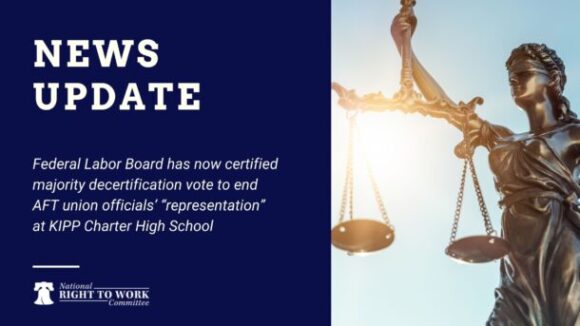Will Team Biden Weaponize Workers’ Pensions?
Big Labor abuse of worker pension and benefit funds as a means of advancing union bosses’ self-aggrandizing policy objectives is a familiar phenomenon.
Eighteen Economists and Labor Experts warn of a ticking fiscal time bomb and prescribe three steps to diffuse the bomb: Right to Work laws for workplace freedom, Wisconsin style public sector union reforms, and the Employee Rights Act.
From FoxNews:
As economists and labor experts from across the country, we believe it’s time for legislators at all levels of government—local, state, and federal—to recognize that the labor reforms begun in Wisconsin need to be implemented nationwide.
The stakes couldn’t be higher. A ticking fiscal time bomb has already begun to explode in some cities, a direct consequence of unsustainable union pay and benefit packages. Meanwhile, state laws that mandate union membership as a job requirement are contributing to a status quo that delivers workers’ paychecks and citizens’ taxes into union hands—and from union hands to the bulging coffers of labor leaders’ favorite political allies.
The appropriate response to this perfect storm of excess is threefold.
First, steer our cities away from insolvency and bankruptcy by passing meaningful reforms to public employee pensions and compensation. Careful economic research has shown public-sector workers receive a level of compensation, pension benefits, and retiree health coverage in excess of what comparable workers in the private sector enjoy. In some instances, the total premium can be 30 percent or higher. The resulting burdens on municipal and state budgets are simply unaffordable.
The next step, at the state level, is to advance right-to-work legislation that gives employees a choice in union membership.
[media-credit id=7 align=”alignright” width=”150″]
[/media-credit]A key tenet of our democracy is freedom of association—including the freedom to form a union. But what about the right of a worker to choose not to join a union? In the 27 states that haven’t passed right-to-work laws, this right doesn’t exist.
In 2012, the state of Indiana showed that such laws can become a reality, even in the face of bitter opposition from labor leaders. Not only are such laws good for employees—they also make good economic sense. Research published in the journal Regulation compared manufacturing employment in counties with a pro-business environment (including right to work laws) to counties across a state border that didn’t have such laws. The study found that manufacturing job growth was nearly 90 percent higher between 1947 and 1992 in the pro-business right-to-work counties.
The last step to effective labor reform should happen at the federal level, with the passage of the Employee Rights Act (ERA), a piece of legislation sponsored by Sen. Orrin Hatch (R-Utah) and Rep. Tim Scott (R-S.C.).
The provisions of the ERA include reinforcing the right to a secret ballot union election, regular recertification votes on whether employees wish to remain part of a union, and paycheck protection to allow employees to prevent their dues from going to politicians they don’t support.
It’s an opportunity policymakers can’t afford to miss.
Richard L. Smith, Philip L. Boyd Chair and Professor of Finance, University of California Riverside
Frank Spreng, Professor of Economics, McKendree University
Lloyd Cohen, Professor of Law, George Mason University School of Law
John P. Cochran, Emeritus Professor of Economics, Metropolitan State College of Denver
Sanjai Bhagat, Provost Professor of Finance, University of Colorado
Roger Meiners, Professor of Economics, University of Texas – Arlington
Peter F. Colwell, Professor Emeritus of Finance, University of Illinois at Urbana Champaign
Thomas Carl Rustici, Assistant Professor of Economics, George Mason University
Kishore G. Kulkarni, Distinguished Professor of Economics, Metropolitan State University of Denver
R. L. Promboin, Adjunct Professor, University of Maryland University College
Edwin T. Burton, University of Virginia, Visiting Professor of Economics
Kamal P. Upadhyaya, Chair, Economics and Finance Department, University of New Haven
Charles W. Baird, Professor of Economics, Emeritus, California State University, East Bay
William Albrecht, Professor of Economics, Emeritus, University of Iowa
Evan Osborne, Professor of Economics, Wright State University
Timothy Mathews, Kennesaw State University, Associate Professor of Economics
Stephen Happel, Emeritus Professor, Arizona State University
Stacie Beck, Associate Professor of Economics, University of Delaware

Big Labor abuse of worker pension and benefit funds as a means of advancing union bosses’ self-aggrandizing policy objectives is a familiar phenomenon.

What impact does handing a union monopoly power to deal with your employer on matters concerning your pay, benefits, and work rules have on your pay?

Federal Labor Board has now certified majority decertification vote to end AFT union officials’ “representation” at KIPP Charter High School